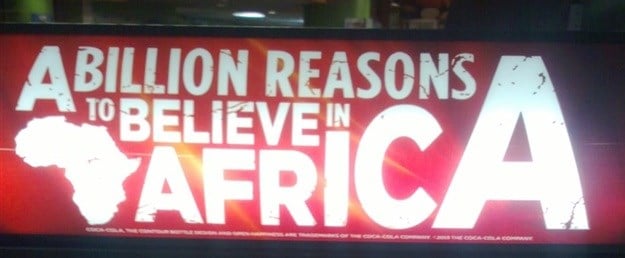Do brands still have a billion reasons to believe in Africa?

The beverage giant had its delivery trucks and coolers branded with this moniker - in a campaign that covered the length and breadth of sub-Saharan Africa.
While the BBC had a host of material covering Africa, like other broadcasters – a feature of African proverbs made the broadcaster’s ‘African-ness’ really standout. Proverbs embody the inspirational wisdom of African folklore.
If having correspondents of African origin covering the continent did not touch the hearts of its African audiences - the BBC award in honour of its African presenter, Komla Dumor, after his death, should have swayed many. Dumor’s exceptional talent in telling African stories turned him into a household name on the continent.
The BBC African Footballer of the Year Award capped the BBC’s commitment to endear itself to this football-mad continent.
And not to be outdone, Standard Bank claimed, ‘They call it Africa… We call it home’. DHL had an audacious pronouncement: ‘No one knows Africa like we do.’ For Guinness, Africa was made of ‘Black’ and the beer brand urged drinkers to show their ‘true colours and choose Black’.
Lancome, the French beauty brand, nominated its first ever black ambassador, Lupita Nyong’o, a Kenyan actress. The list is endless.
The tone from both local and international brands gave a sense of a ‘New Africa’ dawning. Even The Economist, known for its cynicism on Africa’s progress, had to eat a humble pie and brand Africa “hopeful” after decades of calling it a “hopeless continent”. Africa was on the move - with all the hype on economic progress heaped on the continent. Some dubbed Africa the ‘New Frontier,’ and others called it the ‘Next Asia’ and many talked about an ‘Africa Rising’.
Brands’ euphoria waned

Enter 2015, and the mood completely changed. The euphoria brands had on Africa waned as growth fell from 7.8% to 3%, amid warnings by the IMF for the continent to brace for a much bitter 2016. And indeed, 2016 opened with the bad news that Barclays, one of Africa's largest banks, employing 44,000 people in more than 1260 branches on the continent, intended to scale back or exit its Africa operations in a planned global restructure.
This was quite unexpected as the bank had in 2012 boasted of making 20% of its profit out of Africa; and the recently appointed CEO had also spoken gloriously about the bank’s African operation.
Apparently Barclays is not the only brand that had suddenly got disillusioned with Africa’s prospects. In 2013, Nestle had cut 15% of its workforce in 21 African countries, bemoaning that the much hyped African middle class that had enticed the company to invest about $1 billion over the last decade on the continent, had not emerged to expectations.
Coca-Cola, Cardbury, and Eveready are also known to have scaled down their operations for similar reasons. Markets take a cue from these giant multinationals and any depressing news like this spook current and any would-be investors. According UNCTAD, foreign direct investment inflows into Africa fell from $55 billion in 2014 to $38 billion in 2015.
Africa still holds promise
So does it mean that Africa is once more becoming a toxic investment destination? Are the demons that haunted the continent in the past and framed the word ‘Africa’ into a byword for backwardness, descending upon the continent again? No, hopefully not. Africa still holds promise.
Africa’s boom, which was primarily financed by commodity exports to China, was inherently vulnerable as it lacked diversification in terms of exports and markets. And indeed, the economic headwinds facing Africa today are largely down to China’s economic downturn – of course the current drought, lack of food security and fluctuating currencies have compounded Africa’s problem mix.
The commodity boom could be over but Africa still offers competitive investment opportunities. Essentially, the commodity decline did not hurt all African countries the same. While the commodity burst had a crippling effect on commodity-led economies like Nigeria, Zambia, Angola and South Africa, for countries less reliant on extractive commodities like Kenya, Uganda and Tanzania, the commodity slump actually came with a silver lining in the form of cheaper energy sources. Such economies have remained attractive investment destinations.
2 billion-plus reasons to believe
More importantly, as highlighted by The Economist in its April 2016 issue, ‘the continent’s future depends on its people, not commodities.’ The UN estimates the continent’s population to double to 2.5 billion by 2050 – making it not only a billion reasons to believe in the prospects of Africa’s consumer market, but two billion plus reasons in the long-term. When South Africa is taken out of the equation, Sub-Sahara Africa’s median age is 25 years.
Couple this demographic dividend with the rapidly growing population, and the continent has a great potential not only to produce and consume its goods and services, but also to export. The rise in population and income is leading to increased demand in housing, healthcare, education, and retail and banking services among other products and services.
The Africa rising narrative is still alive and sound – though it’s not for those investors hunting for hot money. As rightly put by O’Sullivan of Old Mutual, investors need to take a long-term view of Africa to realise maximum return. Africa is still on spotlight globally.
The billionaire and seasoned investor, George Soros, describes the continent’s growing middle class as one of the ‘only economic bright spots across the world currently’. Starbucks, the American luxury food giant opened a branch in Johannesburg last April – its first on African soil. The Aliko Dangote Group continues to expand investment across the continent with a plan to grow its market capitalisation from the current US$25 billion to US$100 billion by year 2020.
Agility, a global logistics company, has plans to establish a network of logistics distribution parks in 70 locations across the continent – with an eye on Africa’s consumer-facing industries that are expected to grow by $400bn by 2020. Uber, the taxi-hailing app which entered sub-Saharan Africa four years ago, is spreading its tentacles across the continent.
Understand markets prior to entry
A big lesson Uber possibly learnt when it launched in Kenya, after having operated successfully in South Africa, is that cutting and pasting of strategies from one corner of the continent to another may not work in Africa. Africa is not one big homogenous market. Lack of readiness by Kenyans to use the bank card payment system ordinarily offered by Uber, forced the company to adjust its systems to accept cash payments; while the deficiencies in physical addresses in Kenyan cities remains a challenge.
Uber’s experiences in Kenya, as well as Nestle’s gaffe on Africa’s middle class, underscore the need for investors to get a thorough understanding of the continent’s consumer markets prior to entry.






















